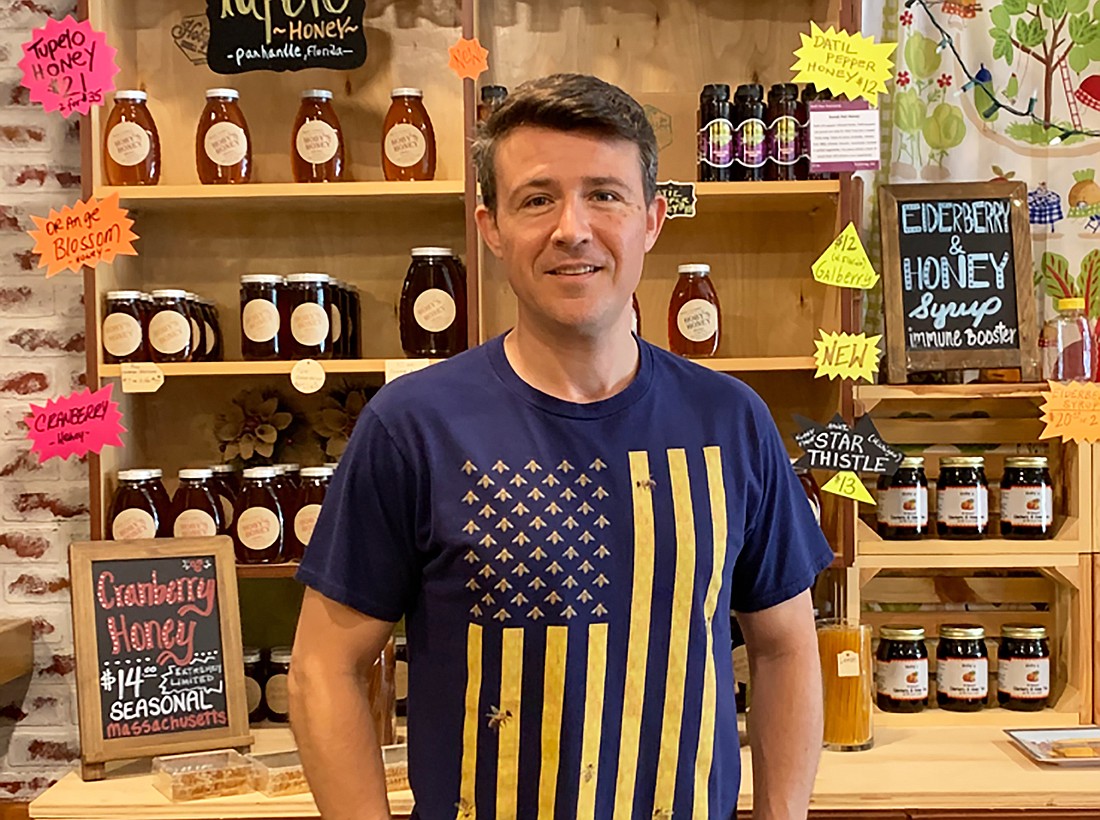
Ryan Hoback said the COVID-19 pandemic has transformed his business, Hoby’s Honey & General Store, in sustainable ways.
Hoby’s, started in 2011, sells honey, sauces, relishes, jams, jellies, candy, teas, spices, crafts and more.
The Mandarin business has been at its current location since April 2018 and nearby for several years prior.
It started as a produce stand in the Mandarin South shopping center.
Sales dropped by half – wholesale sales to hotels and restaurants completely – when the pandemic shutdowns started in mid-March but have since leveled off.
From the start, foot traffic stumbled at his location in the Gates of Olde Mandarin shopping center at 11362 San Jose Blvd.
That’s because Hoby’s and one other store were the only tenants operating in the center after city and state restrictions on retail and restaurant operations to stop the spread of the coronavirus.
Many have reopened, but not all.
“We were fortunate to be open throughout the crisis because we fall into the grocery category, even though we are a specialty store,” Hoback said.
The decline in walk-in sales for eight to 10 weeks forced a new path for Hoback.
Hoby’s had a website for almost two years, but customers weren’t using it to the extent they developed since mid-March.
“We really ramped up online marketing. We ended up investing more into social media,” Hoback said. “It made me focus on that.”
His customer base grew with new shoppers thanks to his online presence at hobysgeneral.com. He also sees more orders from local customers to pick up in the afternoon on their way home.
The online sales helped bridge the gap and “there is a small boost in new customers I hadn’t seen before,” he said.
Hoback said the website grew to comprise 10% of sales. Of the remaining 90%, 75% is retail and 15% is wholesale, comprising hotels and local independent restaurants.
Hoby’s also saw a shift in product categories for eight weeks.
From the end of March through April, Hoback saw customer tastes change from barbecue sauces, jams and jellies to local honey and elderberry syrup “to keep themselves healthy.”
“Most sales were from those two main products for eight weeks,” he said, and they generated new walk-in customers.
Hoback’s store is an efficient 1,200 square feet and stocked primarily with Florida and Georgia-produced food and other products.
He doesn’t need to reduce his rustic store’s physical presence because Hoby’s needs to display its items.
With the lifting of restrictions, wholesale orders are returning.
“I am happy to see orders are coming in and to see that our buddies and our local independent friends are back operating,” Hoback said.
He said sales have resumed for the bulk of the items and overall, “we are 60-70% of the way back.”
Hoback said about half of his dozen area vendors operated throughout the pandemic.
He said he had no problem with his honey supply because beekeeping is sustainable, or from the elderberry syrup source from a Mennonite town in Georgia. Most of the foods branded with his name are made in Montezuma, Georgia.
Hoby’s continued carrying fresh tomatoes, although prices rose.
“Oddly enough, we sold a lot of candles because people were home and burning them more,” he said.
Hoback, 42, is the owner, operator and sole employee of Hoby’s Honey & General store. He will use the $3,000 he received from the federal Paycheck Protection Program for rent.
“We didn’t have to defer our rent or ask for rent forgiveness. We paid all our rent on time,” he said.
Hours fluctuated, but he extended them during the pandemic. His primary hours are posted on the website.
Hoby’s is open six days a week, usually closed Mondays. It typically opens at 9 a.m. daily, closing at 5 p.m. Tuesday-Saturday and 3 p.m. Sunday.
Hoback believes the pandemic transformed the Northeast Florida economy.
“There are some trying and challenging times that people have gone through the last two to three months, but I think our region is probably going to emerge from this better than other places,” Hoback said.
He said the area’s geographic spread allows more distancing than do more congested areas of the state and the country.
“I truly believe our area is going to see an uptick in people moving into the area. I think our businesses will thrive, and we have a good entrepreneurial spirit in this city.”
Hoback is encouraged by what he calls the ingenuity and creativity he sees among area small businesses.
“That bodes well for the resiliency of our community.”